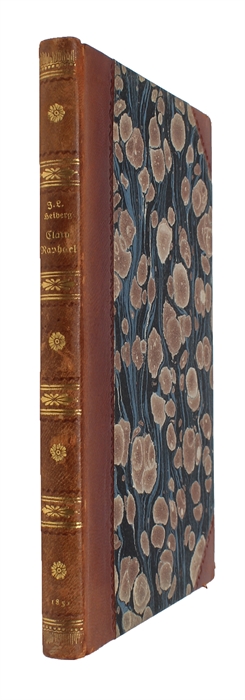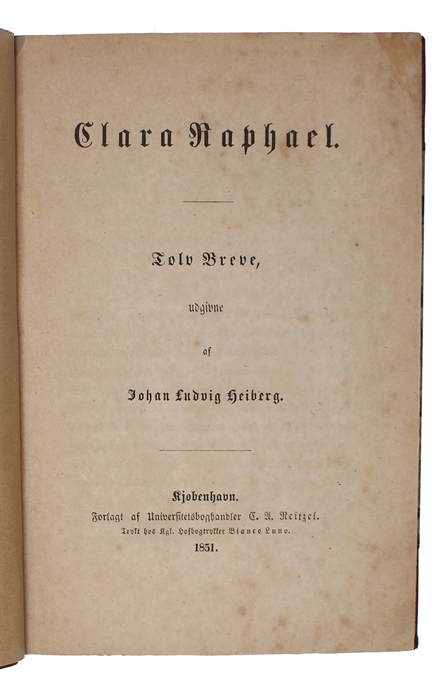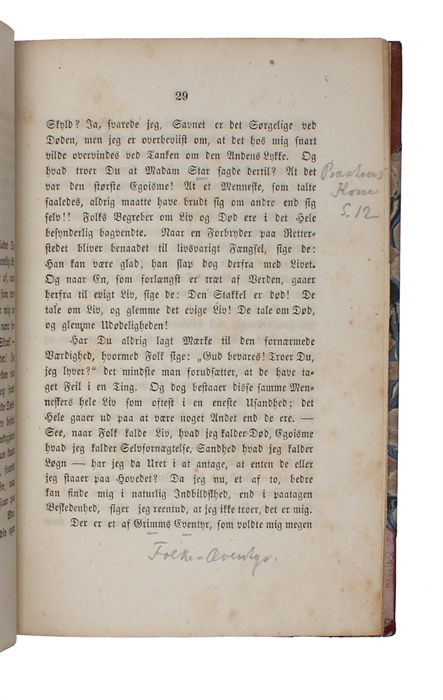FOUNDING FEMINISM IN DENMARK
[FIBIGER, MATHILDE].
Clara Raphael. Tolv Breve, udgivne af Johan Ludvig Heiberg.
Kjøbenhavn [Copenhagen], 1851.
Bound in a lovely, elegant later (ca 1920) brown half calf with gilt spine and blindtamped borders to boards. Some brownspotting throughout. Numerous pencil-annotations. Fly-leaf with old owner's name. Last leaf repaired at inner hinge, no loss.
Scarce first edition of the first feminist novel in Denmark, the highly controversial and influential "Clara Raphael", which is the work that sparked the battle for women's rights in Denmark. The work is is main work of feminism in Denmark and the first Danish governess novel. It founded an entirely new genre of women's novels hitherto unknown in Denmark. The work, which constitutes the break-through of feminism in Denmark, was greatly controversial and immediately caused great furore. It resulted in the so-called Clara Raphael Dispute, in which for instance N.F.S. Grundtvig defended Mathilde Fibiger. Due to the controversial contents of the work, Mathilde Fibiger published it anonymously, and only J.L. Heiberg (1791-1860, perhaps the most famous cultural persona during the Danish Golden Age. He played a more significant role than any other author or thinker during this period) is mentioned on the title-page, as the editor. No publisher had wanted to touch this highly controversial work, and it was only after the appearance of "Jane Eyre" that a publishing house dared take it on.
As Mary Wollstonecraft had pioneered feminist philosophy with "A Vindication of the Rights of Women" from 1792 and argued for education as the means to liberate women, so Mathilde Fibiger surprised her Danish contemporaries with her groundbreaking novel "Clara Raphael. Twelve Letters", from 1851, in which she made the connection between the national-democratic movement and the liberation of women.
With this book, which deals with the inequality of the sexes and the lack of possibility for women to develop themselves, Mathilde Fibiger became the first notable advocate of the emancipation of women in Denmark. It was not only the political controversy caused by the request of equality that made the book so extremely controversial, it was also the ability of the merely 20 year old author to clearly and precisely state and substantiate the essential problems.
When reading the book, it is not difficult to see why it came to have the effect that it did, and why it caused the furor that it did. For instance, Clara Raphael, when despairing at the position of women in society, writes: "Our position in society is tragic, and why? What right does man have to suppress us? For subjugated we are, despite the chains being gilded." She understands that casting off these chains will be no easy matter, and that it will not only be a matter of politics, but also of consciousness and mindset: "When the peasants were granted their freedom, some of them wept, begging for permission to keep things as they had been." One of the beaming sentences of the novel is Clara's response to her friend when asked what she is actually fighting for: "I will fight and live for what I understand by the emancipation of women."
Her hope of breaking with the existing patriarchal system of society required national and democratic self-awareness, which for her constituted a promise of freedom.
In 1871, Frederik Bajer (1837-1922) and Matilde Bajer (1840-1934) founded the Danish Women's Society, the first women's organisation in Denmark. Mathilde Fibiger was one of the earliest members of the Society. When the Danish Women's Society was established, it did not demand female suffrage. It was not until 1906 that a majority of the members were in favour of making that demand the official policy of the Society.
In Denmark, women were not allowed to vote in parochial church council elections until 10+3; not until 1908 were they allowed to vote in parish council and local council elections, and not until 1915 in the Folketing and the Landsting elections. It was not until then that women became fully-fledged citizens in a political sense.
Order-nr.: 60744



